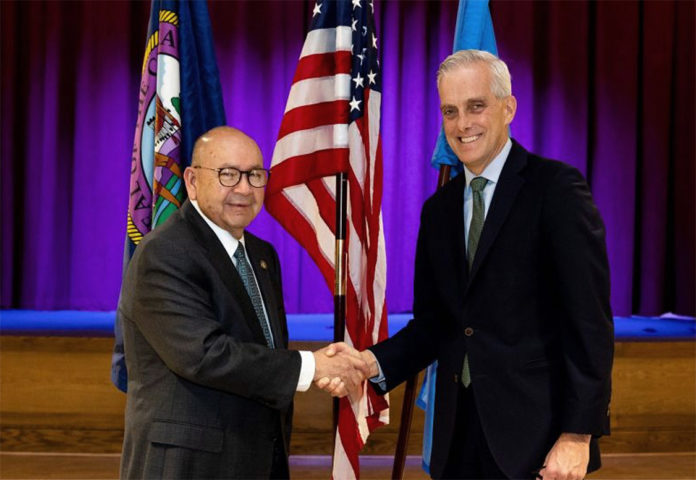
OKLAHOMA CITY, OK – U.S. Department of Veterans Affairs (VA) Secretary Denis McDonough met with Oklahoma tribal leaders in Oklahoma City at a roundtable discussion.
Hosted at the Chickasaw Nation Community Center, the roundtable engaged tribal leaders from across the state in a conversation about their priorities for the VA, its services, and the way it offers those services to First American veterans. Oklahoma is home to 39 federally recognized tribes.
McDonough said the VA was participating in the roundtable meeting with tribal leaders in Oklahoma for four reasons: respect for tribal sovereignty; respect for the government-to-government relationship between the United States and each of the tribes; to demonstrate his personal commitment to engage in tribal consultation; and to listen to each of the tribal leader’s priorities.
“The main job for me today is to listen to you, hear your priorities and continue to build on those,” said McDonough.
Chickasaw Nation Governor Bill Anoatubby welcomed McDonough and other officials and tribal leaders to the roundtable.
“Today, we have the opportunity to ask questions and engage in productive conversation to support each other and our combined efforts to serve those who have greatly served our country,” said Governor Anoatubby.
Governor Anoatubby highlighted the warrior tradition of First Americans and their importance in the U.S. armed forces.
“In every major war and conflict, from World War I, to the wars in Iraq and Afghanistan, tribal citizens have risen to each and every call to serve our nation,” said Anoatubby.
Governor Anoatubby said First Americans represented the largest per capita percentage of any ethnic group in the military in all of those conflicts.
“Officials at the Defense Department have noted that if, during World War II, the entire American population had enlisted at the same rate as First Americans, Selective Service would have been unnecessary,” said Anoatubby.
During the roundtable, VA officials and staff, tribal leaders and veterans discussed the importance of ensuring First American veterans in remote parts of the state have improved access to health facilities and other facilities that offered veteran services. Discussion ranged from programs and facilities the VA operated, improved communication with the federally operated Indian Health Service, and the importance of communication between tribes and the VA.
McDonough and other VA officials said they hoped the dialogue would lead to more effective and accessible services for First American veterans.














































